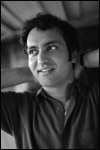
The composer defines his music as "an emotional frenzy of guitar, percussion, brass, woodwinds and strings".
Cinezik: How did your collaboration with Gregg Araki, what were his musical intentions?
Vivek Maddala : Gregg was one of my advisors at Sundance Composers Lab "when I received a Sundance Institute Fellowship for film music in 2008, but I never expected to one day write music for his films ( although I had always admired his talent). And late 2009, I discovered that my friend had Pavlina Hatoupis worked as producer on KABOOM and suggested I submit my collaboration. After a few months, Gregg and Andrea Sperling (Producer) approached me to compose the score to complement the music they already had. Then the scope of my contribution has increased, and every other day they asked me to write more music. In the end, I had the chance to collaborate not only with the director, Gregg Araki, but, essentially, with the various artists whose songs appear in the film (although I've never been in the same room together with these other artists). In some cases, Gregg asked me to write music taking precedence over existing music, to intensify the drama and give it more drive. It was an exciting experience for me and I am grateful to have had the opportunity to work with amazing artists.
Gregg was an outstanding dramatic instinct and knows exactly what he wants in each element of the film. Although not a musician himself, I found that Gregg had a visceral understanding of how music worked with the film and how it could affect the viewer. I composed a song and showed him, he understood right away if the music was effective or not. To my great joy, he was always right. I had very little time to compose my score two weeks for 24 minutes of music, entirely recorded and produced. Thus, Gregg was able to quickly and accurately assess the effectiveness of my music and my ability to make quick adjustments and develop effective musical solutions.
How would you describe the music (instrumental choice) and what is its role for you in the story and characters?
VM: KABOOM's aesthetic is modern, even if the dramatic line of the story is classic, near the gothic tale. Thus, the film itself combines some silly fun with the seriousness and gravity. I tried in my instrumental composition reflect this dichotomy. I played a lot of electric guitar, for textures, moods, and aspects more rock, heavy, and I also played percussion for the score may well mix with the pop songs of the movie. However, for the most dramatic moments, I created a fusion of rock instruments with the orchestra (strings, wood ...), and even a choir for one of the key scenes. Gregg had indicated that for the first time really dramatic movie scene in which the film becomes very dark, he wanted a lyrical music with guitars menacing, drums beating, and ostinato strings with a Wagnerian chorus.
I like to create leitmotifs that are subtle and suggestive, not too obvious. Lorelei's theme is a good example. When the viewer learns the powers of the character, we introduced a piano pattern that captures the delicate quality of his character, with variations of the theme in scenes where she is not physically present, but that his powers affect other characters.
What is this movie for you in your career as a musician?
VM: I have written scores for more than 25 films, TV series, shows, but KABOOM is certainly highlight for me. The opportunity to work with visionary filmmakers Gregg Araki, Andrea Sperling, Beau Genot) was a wonderful experience for me. In addition, Gregg is a filmmaker and author who breaks sometimes iconoclastic traditions to create a unique artistic vision .. and observing that allowed me to develop myself as an artist. The unique method of our collaboration I described above has also been wonderful for me because the musical composition is usually a solitary experience and collaborate with others on musical ideas is something I want to explore further in my career and I am pleased to have had that opportunity here. I think independent film is an amazing creative space for a composer. I am looking forward to working with other filmmakers who have something significant to say.


Interview B.O : Rémi Boubal et César Díaz, un thriller intime au Mexique (“Mexico 86”)
Interview B.O : Delphine Malaussena & Hélène Merlin (Cassandre)
Panorama BO : Le Festival de Cannes en 20 musiques de Palmes d’Or [Podcast]